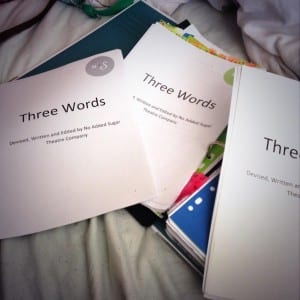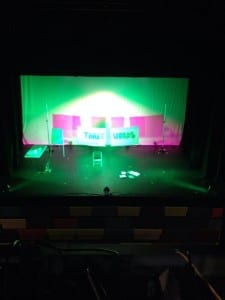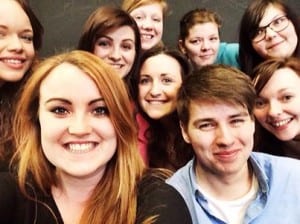Being the stage manager for Three Words was a crazy experience, especially for a first time Stage Manager. It was fun, mad and exciting all at the same time. Watching the company grow over the past few months and seeing how everyone began to work together so quickly was lovely. At the beginning of the process I became the person who pushed everyone to focus as I had a sense of the amount of hard work that would need to be put into the process an thankfully all of our hard work paid off. There were still some aspects that could be adapted with our performance and some scenes could be developed and altered even further but then a performance can never be perfect
On our debut performance night there were some technical aspects that did not go to plan, however this was out of my hands. There was one scene in which the actors were meant to be talking through the microphones but this didn’t happen. When I got in contact with our sound technician Martin, he said that the mics were on and were turned up but I think it as partly to do with the position of the mic in relation to the performer. Thankfully it did not alter the atmosphere of the scene too much. I guess the problem with using all of this technology is that it may have its hitches and not work as it should, that’s the risk you have take when using it. It could either work to help your piece or fail which could hinder your final outcome. Three Words was partly constructed so that if it did have a technological problem then it could still work. Due to most of our performance being live it would have still been a successful (but different) performance if there was a major technical hitch.
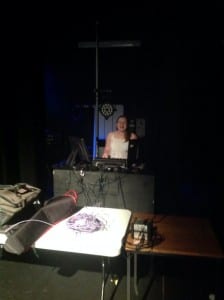
Throughout the construction of our production there were several rehearsals in which the equipment we required was not available to us, we were still successful in being able to run through these scenes and rehearse the lines and actions, which were the important parts, the technology just helped to bring another layer to the performance. You could tell where the technology was missing but it was not always possible to have it with us. I regularly set up the equipment for rehearsals, which when in different rooms/buildings provided a challenge but it was always a case of problem solving and utilising what equipment was available to make our equipment beneficial. Such as connecting the camera to a DVD player in order to make it come through the projector. It has been a fun process, building upon skills that I already had.
Throughout this process I have managed to gain the respect of everyone else in the group, allowing me to keep pushing and keeping everyone focused and on task. This was something I was a little bit worried about at the beginning of the process, being quiet and generally shy I was not sure how this whole process would pan out, but it went better than I could have hoped for. I managed to gain the trust of individuals so they would then believe the advice that I was giving them. This was also the case with not only aspect of the rehearsal but also to do with the technical aspect to the production. Having a varied knowledge on technical allowed me to input my suggestions and offer advice as to whether something would not only work but if it would work would it look good, the answer was not always yes… Correct that most things could be produced but it would not have always suited our performance. This was not always the answer people wanted to hear, but providing reasons as to why it would not work helped to back up my point.
I feel this process and No Added Sugar is just the beginning for me, and hopefully everyone else in the company. It has provided me with an insight into an area that I had not yet explored. I feel that Three Words will not (hopefully) be just a one performance thing. There is so much more left that it has to give. It still has plenty of room to grow and develop just like any other show, and I do not think it has a time limit, it is not held down to a certain date as it explores so many different aspects.
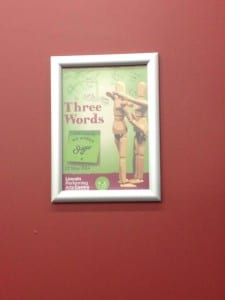
We have left our mark here at the Lincoln Performing Arts Centre. Our poster made it onto the Green Rooms wall! How exciting… This is the end of our time at this venue but is there a chance we, No Added Sugar, could return one day…
